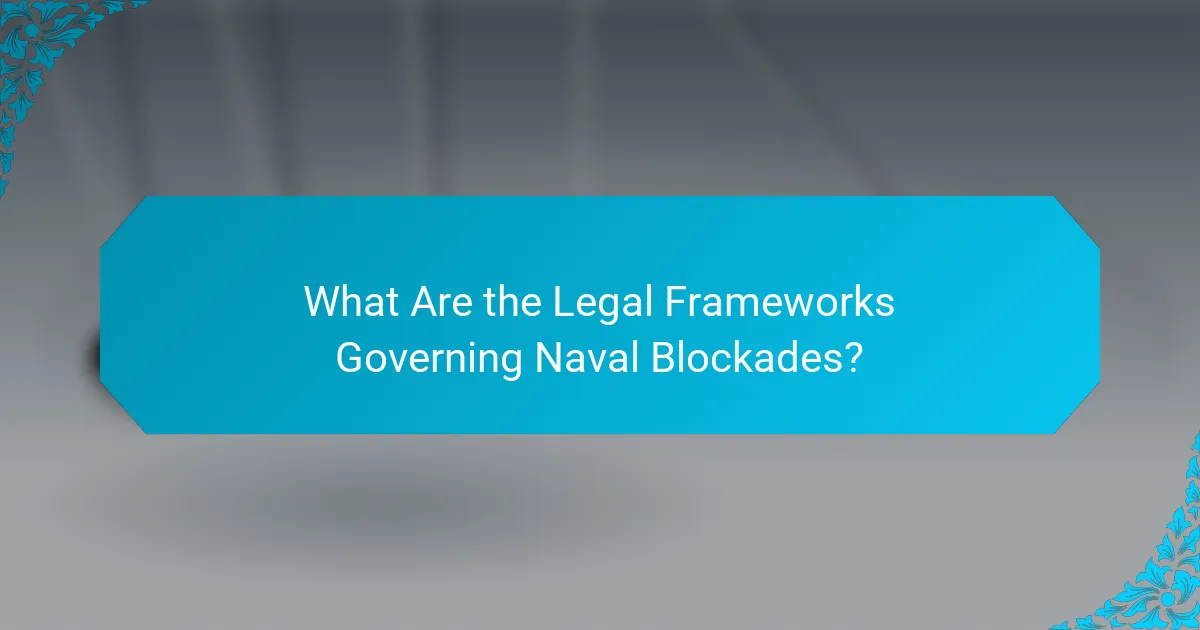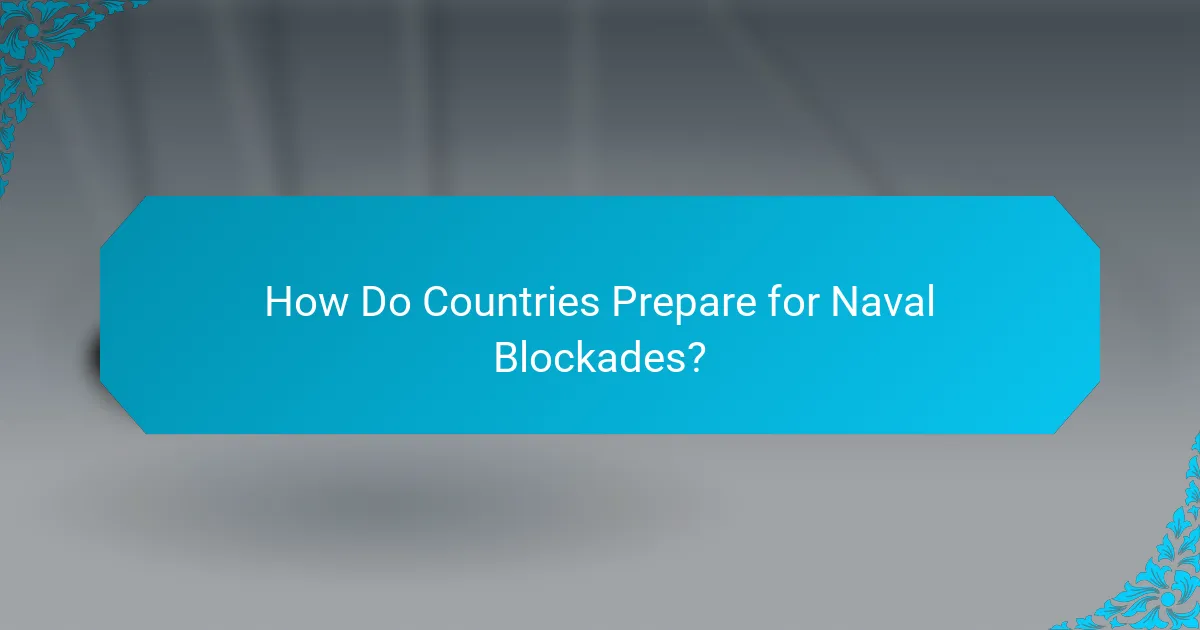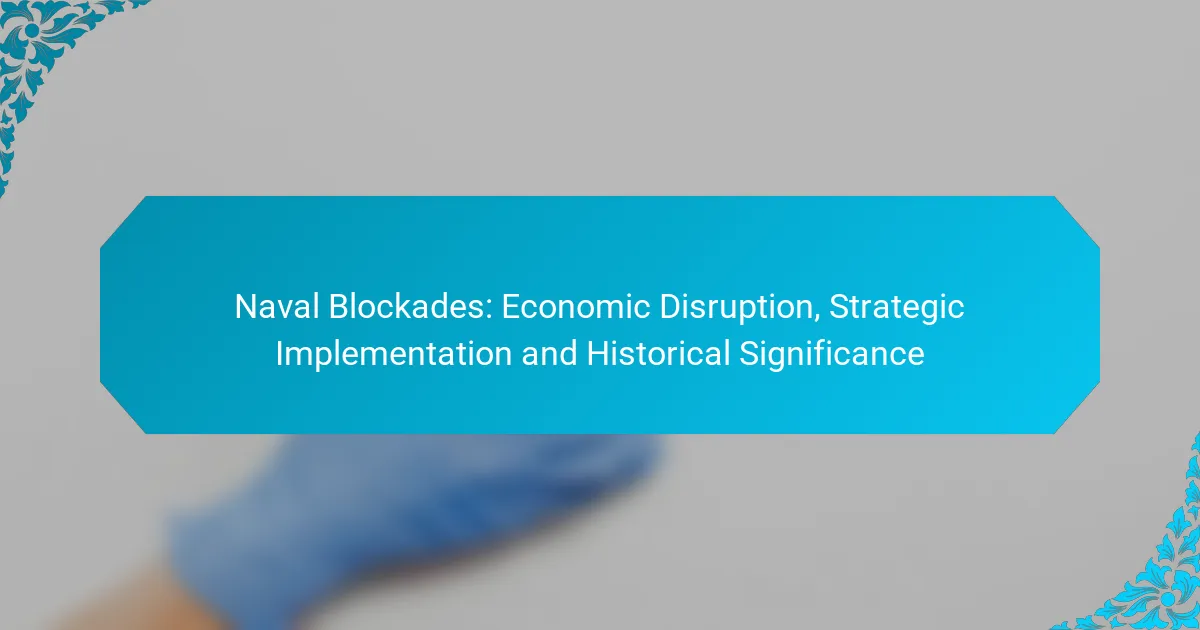Naval blockades are a significant tactic in maritime warfare, designed to disrupt economies by limiting maritime trade essential for the flow of goods and resources. By restricting an adversary’s access to the sea, these blockades not only aim to achieve military objectives but also create long-term economic instability. Historically, they have shaped critical outcomes in conflicts, as seen in notable examples such as the Blockade of Germany during World War I and the Cuban Missile Crisis blockade.

How Do Naval Blockades Disrupt Economies?
Naval blockades disrupt economies by restricting maritime trade, which is vital for the flow of goods and resources. This disruption can lead to shortages, increased prices, and long-term economic instability.
Impact on Trade Routes
Naval blockades directly affect trade routes by preventing ships from entering or leaving ports. This can lead to significant delays in the delivery of goods, forcing companies to seek alternative, often more expensive, shipping methods. For instance, a blockade in the Mediterranean can reroute cargo ships around Africa, increasing transit times and costs.
Effects on Supply Chains
Supply chains are heavily reliant on timely deliveries, and blockades can create bottlenecks. When key shipping lanes are blocked, manufacturers may struggle to obtain raw materials, leading to production slowdowns. Companies may need to stockpile supplies or find local alternatives, which can be costly and inefficient.
Influence on Commodity Prices
Blockades can lead to fluctuations in commodity prices due to supply shortages. For example, if a blockade affects oil shipments, prices may spike as demand outstrips available supply. This can have a ripple effect on other goods, as transportation and production costs rise.
Consequences for Local Economies
Local economies that depend on maritime trade can suffer greatly from blockades. Job losses in shipping, fishing, and related industries may occur as businesses struggle to adapt. Additionally, communities reliant on imported goods may face shortages, leading to increased prices and reduced access to essential items.
Long-term Economic Repercussions
The long-term repercussions of naval blockades can be severe, leading to structural changes in economies. Countries may invest in alternative trade routes or develop domestic industries to reduce reliance on imports. Over time, this can reshape economic landscapes, potentially leading to decreased international trade relationships and increased isolationism.

What Are the Strategic Objectives of Naval Blockades?
Naval blockades aim to achieve specific strategic objectives, primarily by restricting an adversary’s maritime access and disrupting their economic activities. This tactic serves military, economic, and national interest goals, making it a powerful tool in maritime warfare.
Military Control of Maritime Areas
Naval blockades establish military control over key maritime regions by preventing enemy vessels from entering or exiting ports. This control can limit an adversary’s ability to reinforce their forces or transport critical supplies, thereby weakening their operational capabilities.
Effective blockades often involve the deployment of naval assets to monitor and enforce restrictions, which may include the use of surveillance technology and strategic positioning of ships. Historical examples, such as the British blockade during the Napoleonic Wars, illustrate how controlling sea routes can significantly impact the outcome of conflicts.
Economic Pressure on Adversaries
Naval blockades exert economic pressure by disrupting trade routes and limiting access to essential goods and resources. This tactic can lead to shortages, inflation, and economic instability, ultimately undermining the adversary’s war effort and public morale.
For instance, the U.S. naval blockade of Cuba during the Cuban Missile Crisis effectively curtailed the flow of military supplies to the island, demonstrating how economic disruption can influence geopolitical situations. The effectiveness of a blockade often depends on its duration and the resilience of the targeted economy.
Protection of National Interests
Naval blockades serve to protect national interests by safeguarding trade routes and ensuring the security of maritime resources. By controlling access to strategic waterways, nations can prevent adversaries from exploiting these routes for military or economic gain.
Countries may implement blockades to defend vital shipping lanes, such as the Strait of Hormuz, which is crucial for global oil transport. This protective measure can deter aggression and maintain stability in regions where national interests are at stake.

Which Historical Examples Illustrate Naval Blockades?
Naval blockades have played a crucial role in shaping military and economic outcomes throughout history. Key examples include the Blockade of Germany during World War I, the Cuban Missile Crisis blockade, and the British blockade of Napoleonic France, each demonstrating the strategic impact of maritime restrictions.
Blockade of Germany in World War I
The Blockade of Germany during World War I was a significant naval operation aimed at restricting supplies to the Central Powers. Implemented by the British Royal Navy, it effectively limited Germany’s access to essential goods, leading to widespread shortages and economic strain.
This blockade was characterized by its extensive reach, affecting not only military supplies but also food and raw materials. The resulting famine and public discontent contributed to Germany’s eventual surrender in 1918.
Cuban Missile Crisis Blockade
The Cuban Missile Crisis in 1962 featured a naval blockade, termed a “quarantine,” to prevent the Soviet Union from delivering additional missiles to Cuba. This strategic move by the United States aimed to protect national security and assert dominance in the Cold War context.
The blockade was effective in halting Soviet shipments, leading to a tense standoff that ultimately resulted in the removal of missiles from Cuba. This example illustrates how a naval blockade can serve as a tool for diplomacy and military strategy.
British Blockade of Napoleonic France
The British blockade of Napoleonic France from 1806 to 1814 aimed to weaken France economically and militarily by cutting off trade routes. This strategy was part of the broader Continental System, which sought to isolate Britain’s enemies.
By restricting French access to vital imports, the British blockade significantly hampered France’s economy, leading to shortages and contributing to the eventual downfall of Napoleon. This historical instance highlights the effectiveness of naval power in achieving strategic objectives through economic disruption.

What Are the Legal Frameworks Governing Naval Blockades?
Naval blockades are governed by a combination of international maritime law and specific United Nations regulations. These frameworks establish the legal basis for implementing blockades, ensuring they comply with international standards and humanitarian considerations.
International Maritime Law
International maritime law, particularly the United Nations Convention on the Law of the Sea (UNCLOS), outlines the rights and responsibilities of nations at sea. Blockades must be declared by a belligerent state and must not violate the rights of neutral states or impede humanitarian aid.
For a blockade to be legally recognized, it must be effective and enforced without discrimination. This means that all vessels must be treated equally, and any exceptions should be clearly justified to avoid accusations of illegality.
United Nations Regulations
The United Nations has established regulations that further define the legality of naval blockades, particularly in relation to sanctions and peacekeeping operations. These regulations often require a Security Council resolution to authorize a blockade, especially in situations involving humanitarian crises.
Compliance with UN regulations is crucial, as violations can lead to international condemnation and potential repercussions. States must ensure that their blockades are not only strategically sound but also aligned with global norms and humanitarian principles.

How Do Countries Prepare for Naval Blockades?
Countries prepare for naval blockades by developing comprehensive military strategies, assessing their naval capabilities, and establishing logistical support systems. This preparation involves not only the deployment of naval forces but also the coordination of intelligence and supply chains to effectively enforce the blockade.
Strategic Military Planning
Strategic military planning for naval blockades focuses on defining objectives, identifying key maritime routes, and determining the necessary resources. Countries must evaluate their naval assets, including ships and submarines, to ensure they can effectively monitor and control targeted areas.
Effective planning also involves collaboration with allied nations to enhance operational capabilities. Joint exercises and intelligence sharing can strengthen the overall effectiveness of the blockade, allowing for a more coordinated response to potential threats.
Additionally, countries should consider the potential economic impacts of a blockade on both their own economy and that of the target nation. Understanding these dynamics can help in crafting a strategy that minimizes backlash while achieving strategic goals.



